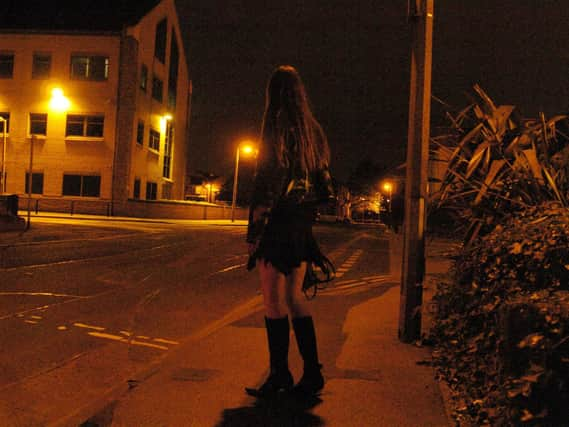Three lockdowns later: The impact of Covid on Holbeck's red light zone


The managed area, dubbed the country's first 'legal' red light zone, allows sex workers to operate within agreed hours, without the fear of arrest.
The scheme was introduced by safety partnership Safety Leeds in 2014 - a group which includes Leeds City Council and West Yorkshire Police.
Advertisement
Hide AdAdvertisement
Hide AdThe Managed Approach has been temporarily paused during lockdown and a charity has said some women have no choice but to work with little support available to them.
Basis Yorkshire supports sex workers working 'indoors and on the street' in Leeds.
Amber Wilson, who works for the charity, said: “Covid continues to have an impact on the lives of sex workers, including the temporary closure of the Managed Approach for women working on street.
"Basis have been offering an enhanced level of service during the pandemic to support women during this time and will continue to do so within the resources available.”
Advertisement
Hide AdAdvertisement
Hide AdBasis has paused its outreach work during the third national lockdown and encourages on-street workers to consider other forms of sex work where possible, such as using webcam and adult websites.
But some women are still working in the zone during lockdown and the charity continues to offer support over the phone during its usual outreach hours.
The controversial approach has been met with criticism from some members of the community and protests against the zone were held last year.
One of the most vocal critics of the Managed Approach campaign group Save Our Eyes, has called for an exit strategy to the zone.
Advertisement
Hide AdAdvertisement
Hide AdPaula Brown, a member of Save Our Eyes, believes since the zone began in 2014, there has been a “huge increase in problems for the local community, as street prostitution and kerb crawling have spread across the residential area near the zone."
She added: “There is no evidence that the risks to residents are outweighed by the benefits of the scheme to the prostituted women".
The risks Paula discussed include addictions, such as drug addiction and alcohol addiction.
Save Our Eyes has a website which often shares images of condom wrappers and needles on the ground in the Holbeck area.
Advertisement
Hide AdAdvertisement
Hide AdPaula added: “People need to understand this is not a poverty issue for the women, it’s an addiction issue. It’s not about the whole sex working cohort, the Holbeck zone is only used by about five per cent of Leeds sex workers and they have a unique demographic.
“Most of them are addicted to heroin or crack so all the money they earn goes to the drug dealers. It’s a form of modern slavery".
Amber of Basis Yorkshire responded: “We continue to point out, as we have done on previous occasions, that issues such as addictions to alcohol or drugs, trauma, domestic violence or other forms of exploitation are a significant challenge to overcome and can take many years and significant barriers to access effective support remain in particular in an era of austerity and high unemployment."
Basis works with other charities and services in Leeds, such as the Joanna Project, St. Anne’s Resource Centre, Leeds Sexual Health and Forward Leeds.
Advertisement
Hide AdAdvertisement
Hide AdAmber said: “While we are currently not delivering outreach, Basis and the Joanna Project are in daily contact with the police in terms of the women that have seen as well as being on the other end of a phone during our usual outreach hours, working closely with the police to ensure they can offer practical support to women they meet.
“Over the past year this has resulted in women reducing their substance abuse, women leaving their violent partners (in some cases prosecuting them), feeling safer due to improving their housing situation, feeling less isolated, accessing mental and other health support, women accessing volunteering, training and/or employment.”
In 2019, Leeds City Council commissioned an independent review by academics at the University of Huddersfield to examine how the MA had developed since its introduction and whether it should continue.
The findings were published in July 2020, with the conclusion being that it was "more effective at reducing the impact of problems associated with on-street sex working than any other approach or model".
Advertisement
Hide AdAdvertisement
Hide AdHowever, review lead Professor Jason Roach stressed that the approach must continue to evolve and adapt.
This year, a new report was published by a coalition of Holbeck community groups to vocalise the concerns of residents.
Comment Guidelines
National World encourages reader discussion on our stories. User feedback, insights and back-and-forth exchanges add a rich layer of context to reporting. Please review our Community Guidelines before commenting.